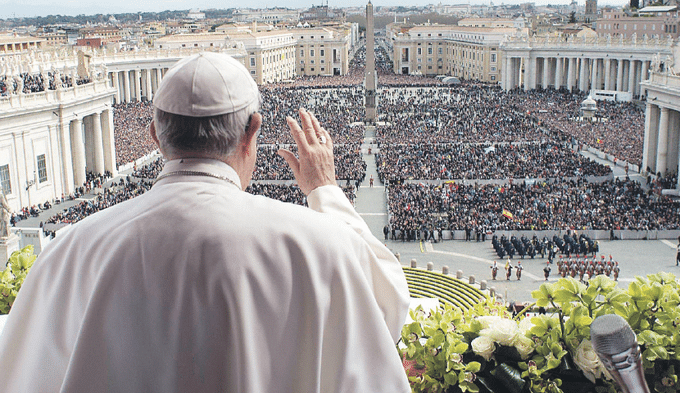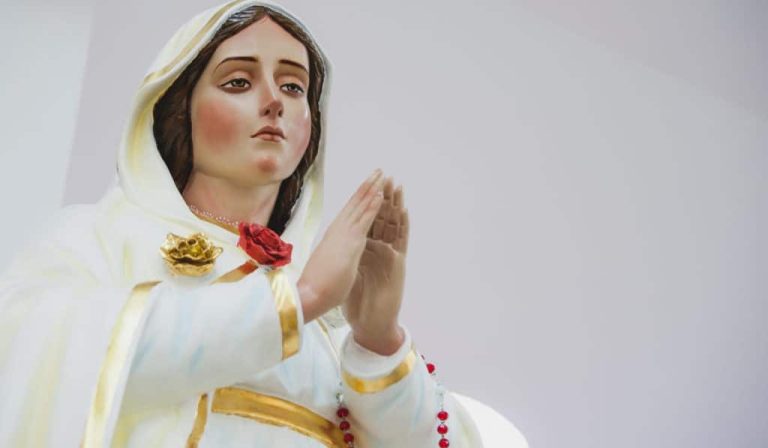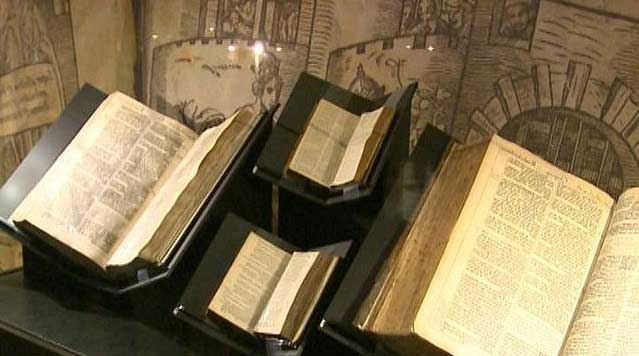The magisterium of the Church What is it? and your grades
Magisterium of the Church is the way the Catholic Church expresses itself to refer to both the functions and the teachings imparted by the Holy Pope and the bishops who commune with him.
What is the Magisterium of the Church?
Magisterium of the Church , what does it mean? what does the bible say? Mt 16,18 tells us that it is that place where God builds his Church and the demons do not have access to it. And where bound to heaven or hell they will remain bound to it for the rest of eternity.
The word magisterium arose from the mission that was entrusted to the Church, that is, “Teacher of men.” The Church, therefore, is the institution responsible for caring for, guiding and watching over the people of God.
According to the catechism of the Catholic Church, the Magisterium of the Church refers to any act expressed in a written or oral way that authentically interprets the word of God.
However, Protestants continually claim that the Holy Bible is the only and legitimate word of God and that outside of it there is no “divine inspiration”, is this true?
The Bible was introduced by the Catholic Church, and before this the teachings of Jesus were given orally. The Bible certainly contains the word of God even though it has been written by men, since it aims to save anyone who wishes to follow the path traced by God.
The Bible is a revelation (and demonstration) of God’s love for us: his people. Oral transmission accompanies and precedes the gospel.
The gospel shows us the word of God and offers us the path we must follow if we want to achieve our salvation, the forgiveness of our sins and enjoy a life with the father, a life of eternity, joy, thanks and happiness.
It is said that a Magisterium of the Church considered authentic is one that interprets the word of God but has also been instructed by our Lord God and is permanently under the grace of the Holy Spirit.
This responsibility, of course, falls on holiness and its bishops, as they are the highest representatives of God on earth and are the ones who, delivered to a doctrinal body, profess the word of God and cannot be questioned or accused of being “false” by any institution on earth.
The doctrine of the magisterium of the Church has at least 2000 years since it has been imparted, therefore, the best we can do is abide by it as truth, without contradicting its authority or the words that God has expressed according to it.
Magisterium of the Church , what are its degrees and where can we find them? In canons 750 -754 of the Code of Canon Law, which states that any tradition transmitted orally or in writing by the Church must be accepted as “truth”, however, the Motu Proprio Ad Tuendam Fidem decided to give it a new perspective on May 18, 1998.
Within the Magisterium of the Church we can identify three (3) degrees, among them, we can highlight: The first, the doctrine of divine and Catholic faith, the second, the doctrine raised by the ordinary and universal magisterium, and finally, the definitive doctrine .
In search of the truth
2 Timothy 3: 16-17 tells us that all scripture is inspired by God himself, and serves God’s representatives on earth to generate Christian men and women from justice and prepare them for good works.
John 21:25 tells us that Jesus performed so many more actions that we do not know that there would not be enough books in the world to describe and detail each one of them.
Most of the teachings transmitted both by Jesus and continued by his disciples after his death were carried out orally, only some of them were taken and given a new meaning by translating it into writing, where any man, thirsty from God you can learn, follow his path and save your soul.
Although the apostles were only men, their word is considered by the Church as true, since it was not they who spoke, but the Holy Spirit who manifested through them, and their words, taught from generation to generation, must be considered then ” tradition”.
Saint Paul himself exhorts us to follow the word of God and of his disciples, and also to complement it with the written word, that is, what we know today as the New Testament.
2 Thessalonies 2:15 tells us that we must be firm and retain the doctrine without diminishing its value because it comes from man, because his word (even written) comes from God.
Many of the apostolic oral traditions were written by the first successors of the apostles, but because they were not written by the apostles themselves, the Church then decides not to include them in the holy book or Holy Bible.
Some examples of this are: the Work “the didache”, probably written in Rome in the years 40-50 AD, the letters of Clementes to Corinthians and other churches, the letters of Saint Ignatius of Antioch, among others, which although they were not God’s disciples were inspired by Saint Peter, Saint Paul and Saint John and their teachings.
Peter, custodian of Truth
According to Peter: 20-21: Both, together, both word and scriptures must be seen as teachings of the Holy Spirit that through the Ministers and the apostolic fathers are sufficient and necessary for the teaching of the true unique doctrine of Jesus Christ under a single interpretation of holy scripture.
Carrying thus, a single message as universal and professed by a single Church as the only institution commissioned by Jesus Christ to bring us the complete truth and revealed by the Holy Spirit, which is the spirit of truth, which guides in one way or another this complete teaching to our ministers, whose mission is to make known to us the gospel of Jesus Christ.
This is what is known as the Magisterium of the Church and is made up of the father and the bishops in communion with him, who have been entrusted with the task of “shepherding” the flock of God.
Each Pope is the successor of the apostle Saint Peter who guards the doctrine of the Church, and each bishop is, in turn, the successor of the apostles, so then, we can say that the Magisterium of the Catholic Church is the one who can teach the true doctrine of the teachings of Jesus Christ.
The magisterium of the Church is then the only institution capable of affirming and assuring that the books that make up the New Testament are legitimately apostolic, that by tradition they were protected by the Church.
Our brothers then are the only ones capable of attesting that the Bible and only the Bible is the only tool that bases the truth and contains the authentic and genuine teachings of the Master Jesus, to later be transmitted and multiplied through preaching.
God decided to found his “Church” in his apostle Saint Peter, and gave him the responsibility to maintain, preserve, interpret and share the message that had been entrusted to him, also keeping it intact, without intervention or supposition of any kind.
The evidences to know the Truth
In the same way that we trust archaeologists to find proof of our ancestors and attest that there was a civilization older than us, the Church cannot, under any circumstances, invent a doctrine or adapt it to its will, since this he is under the service of God and the grace of the Holy Spirit.
What greater reliable proof than tradition and the scriptures to demonstrate that the “revelation” did exist? Lk 10, 16 tells us that listening to God’s representatives on earth is as if we were listening to him.
The Church made up of all the baptized
The Church is much more than a Hierarchical representation, all those baptized are also a vital part of this great institution, who together with the bishops and other representatives of God, make up the servants of God, obedient, humble and loving towards their father, and their time, form a great community or army of salvation united by the master Jesus.
If bishops and laity are satisfied and in agreement with ethical and moral doctrines offered by the Holy Spirit, then we can be calm and confident like them, that their faith is strong and tradition is based on the revelations offered by the messenger of God. , the holy spirit from his grace.
Dogma
Dogma is all that forceful and irrefutable truth professed by the magisterium of the church . Normally, it is linked to various truths, so that all the people, along with bishops and other representatives of God, accept and adopt this fact, doctrine or tradition as truth.
This truth can be affirmed as such, if and only if, it is linked to other truths, and furthermore, it is confirmed by the Magisterium of the Church as a revelation or illumination by the same holy spirit.
Some examples of dogmas in which the Catholic Church and its people believe are: the conception of the Virgin Mary despite keeping her virginity intact and not having had any contact with any man, or the presence of the body and blood of Christ in the eucharist and the wine offered by the father to his people at “communion”.
The dogmas are fair and necessary since they offer new lights, new paths or new perspectives before the path traced by God, filling us with security and helping us to strengthen our faith when it falters, they are like our base, or our reminder that the word of God is real and he always keeps his promises.
Despite personal, family or any other problems, the Magisterium of the Church will be concerned to find an answer in God, and offer us new lights so that together we can live better and enjoy a full, joyful and happy life together with the God’s love and mercy.
Can the Magisterium be wrong?
With the help of God and his messenger, the Holy Spirit, it is impossible for the Magisterium of the Church to make any mistake. There can be no error in the transmission of the message or faith when it comes from the highest divine source, that is, from God himself. This allows the Church to attest to its truth and proclaim it as absolute truth.
This certainty can be exercised or demonstrated through various actions:
The Pope enjoys “infallibility” when, as the highest representative, teacher and pastor of his faithful, he announces a dogma of faith. We say then that the Pope speaks ex-cathedra .
It is also considered “infallible” when the Episcopal College, in union with the Pope, and integrated with the bishops, participate in what is known as an ecumenical meeting, since in this meeting, the unification of the Churches as a single body, institution and representative of the message of God for his people.
When the Magisterium through the church declares a new dogma or irrefutable truth. Faced with such a revelation, the people must accept it as “truth” and then the pope enjoys “infallibility” due to such revelation.
When the bishops in communion with the Pope, profess teachings that promote a better understanding between the Church and its faithful. Although the teachings professed within the ordinary magisterium do not have an “infallible” character, as faithful, we must submit with docility and absolute obedience to these teachings.
The Holy Spirit helps find the truth
Jn 8:31-32 tells us that staying faithful to the truth of our God will make us true disciples of him, since in this way and only in this way will we know the truth and this truth will give us freedom.
The Holy Spirit is always willing to accompany the servants of God, this has allowed the teachings revealed by God through his grace to his disciples, and later, to the Pope and other representatives of the Church to be more and more clearly understood. and accepted without question.
However, God wishes that just as his representatives find it increasingly easy to listen to him, his people also listen to him and accept his word, truths and way without question, in how many more ways does God have to show us that he loves us to submit to his will? ?
God wants all his Christian and faithful sons and daughters to work not only to understand these truths in a profound way, but also to apply them to our lives. The question then would be, how do we do this?
Reading and rereading the sacred scriptures (gospel) and submitting to the traditions, finding in each of them the truths that “hidden” behind these words. Wondering and reflecting on what message does God want to give us through his writings and teachings?
Saying it, or in this case, reading it, is easy, applying it, putting it into practice is the real challenge we must face. The “easiest” way to achieve this is to have and open our hearts. Review in a deeper way everything we have learned, interpreting it over and over again until we fully understand its message.
For example, perhaps you have always known by “general knowledge” that God is our Father and Mary our Mother, but you have thoroughly analyzed what it means to enjoy heavenly parents? how happy and fortunate we are for them? How can we show them our love and gratitude?
This is what we actually mean by “taking a deep look” at what you already know. Once you achieve it and accept it in the depths of your heart, then your life will have taken a turn of one hundred and eighty degrees (180º).
Another way you can achieve this is by actively and consciously listening to the word offered by bishops and popes, since these are the highest representatives of God on earth and we must obey them.
Interpret the truth that they offer you in your own way, but if you need support, feel free to tell them about your concern, they will be able to guide you.
Revelation, scriptures, tradition, teachings and magisterium, none can live in isolation, since they want to or not they are and will always be connected to each other.
It is impossible not to know God and not love him, and after we love him, it is impossible not to serve him with joy and happiness. So let us ask him every day to better understand his doctrine, better understand his message and continue to serve him.
Every time we discover ourselves better understanding the doctrine of God, then we will better understand how lucky we are to enjoy so much love.
Doctrine of the Divine and Catholic Faith
It is the doctrine revealed by God and offered as truth. In canon 750, God tells us that all teaching from the Church or from the ordinal magisterium must be accepted as “absolute truths” without questioning them under any circumstances.
To deny a tradition or doctrine (and also consciously) is to sin as a heretic, and such an act must be punished with excommunication.
Some examples of doctrines of divine and Catholic faith, and which are also approved by the Solemn Magisterium, exist in abundance throughout the history of the Church, among them, we can mention from the Christological dogmas to the Marian dogmas or the assumption of the virgin mary that have been approved more recently.
Ultimate Doctrine
Those teachings imparted by the same magisterium of the Church are considered as definitive doctrines, with an “infallible” character so that it can be received and accepted by its faithful as an “irrevocable truth”.
A doctrine is considered as “definitive” by the way, in this case, when its revelation comes from God or the holy spirit.
Whoever rejects in a stubborn and insistent way, even despite being admonished for the first time and opposes Catholic doctrine, commits a canonical offense, which must be punished with a just penalty that corresponds to such an act.
An example of this would be: a dogma, because once announced, it cannot be overthrown even by the Pope himself, even though he represents the highest authority.
Another example would be the various ecumenical meetings, in which the Pope, the bishops, mainly participate and discuss and promote the unification of the Churches as one and under the same message from God for his people.
Our faith in this doctrine does not point to God, but rather, in the faith of the assistance offered by the Holy Spirit to the magisterium of the Church, and in turn, before the infallibility of this and in the doctrines that they offer us.
A doctrine imparted by the magisterium of the church is considered a “non-defining” act. What does this mean? That said doctrine is imparted by the ordinary magisterium of the Church, as well as by the bishops and other representatives of God on earth.
However, it is important to note that for these non-defining acts to be accepted as truths, they must be reaffirmed by the Supreme Pontiff, that is, by the Pope himself, expressing that said teaching belongs to a teaching contained by the ordinary and universal magisterium of the church, therefore, must be considered as a divinely revealed truth of Catholic doctrine.
Ordinal and Universal Magisterium
These are those doctrines respected by the faithful but that do not require us to assume them as “absolute truths”. We could say that they can be taken in a “non-definitive” way, because they are not considered “infallible teachings”, but our faith must be in the source.
Unlike the previous doctrines, this type of teaching must be conceived and internalized from the will and the need to understand it personally.
The teachings from the magisterium and the universal help us to understand its revelations in a deeper and more intelligent way, either to show the truths of the faith, or to avoid opinions that may lead us to deny them or consider them wrong or imprudent.
An example of doctrine of divine and Catholic faith, and also, that is approved by the ordinary Magisterium would be the voluntary death of one of his children.
These teachings offered by the authentic and ordinary Magisterium can be shown as “not definitive” since they claim a degree of adherence that will depend and vary according to the perception of the mind and the will manifested in certain documents.
Is it then possible to make mistakes in this last categorization? The answer is yes”. Despite this, we should not continually doubt how much teaching is provided to us just because it is not corroborated by a representative such as the Supreme Pontiff.
We must trust in the source and then submit ourselves just as the supreme pontiff submits to the magisterium of the Church . Doubting these teachings would be as absurd as doubting that the sun revolves around the earth, when we know perfectly well that this is true. Perhaps, we cannot verify it, but the faith of all humanity makes us believe in it and assume it as “true”.
In other words, it is important to recognize the importance of the magisterium of the Church, as well as the desire to repeatedly transmit a doctrine to us orally or in writing.

Hello! Let me enthusiastically introduce myself as a dedicated blogger fueled by an intense passion for meticulously crafting insightful and well-researched blogs. My mission revolves around providing you, dear readers, with a veritable treasure trove of invaluable information.







